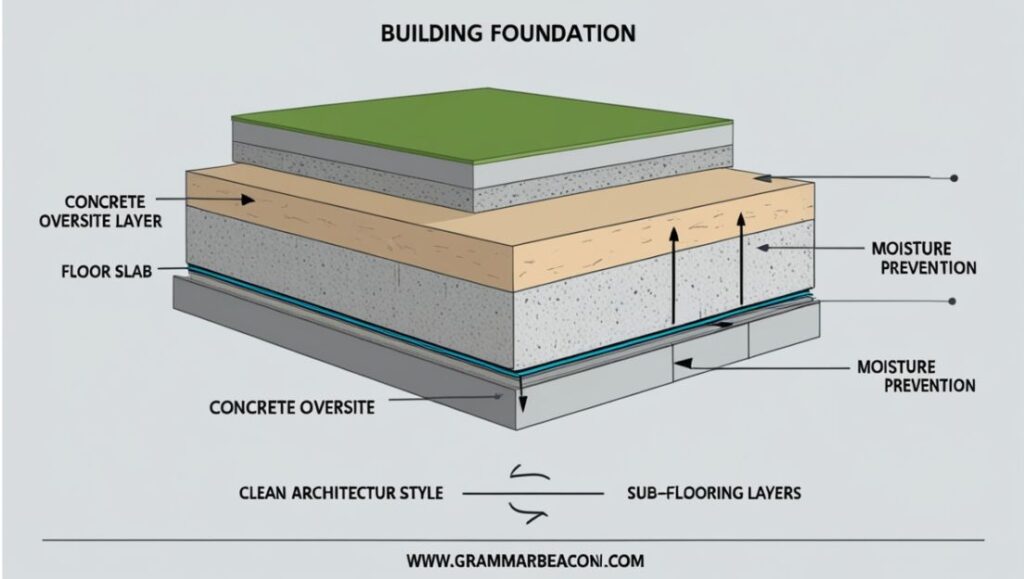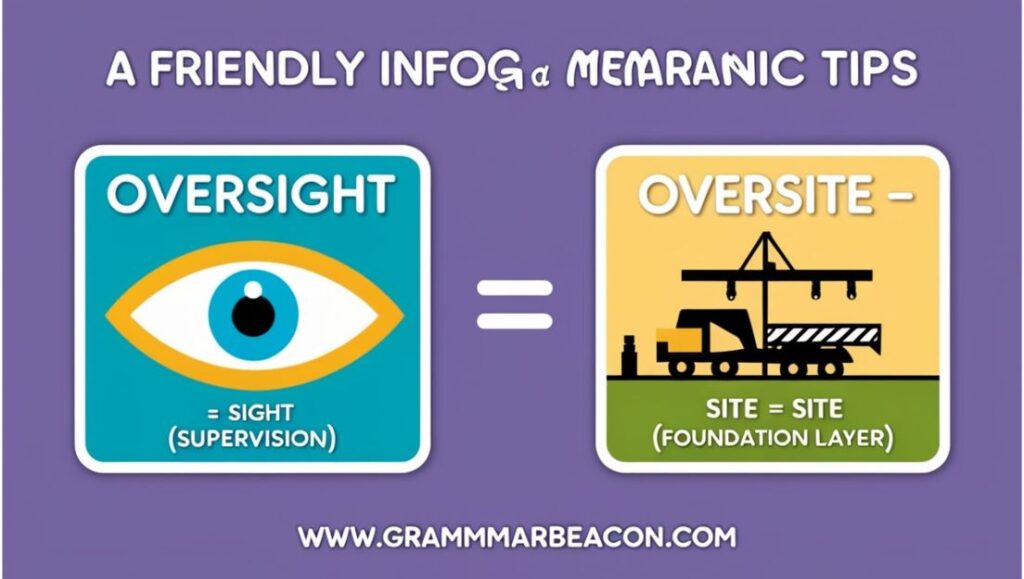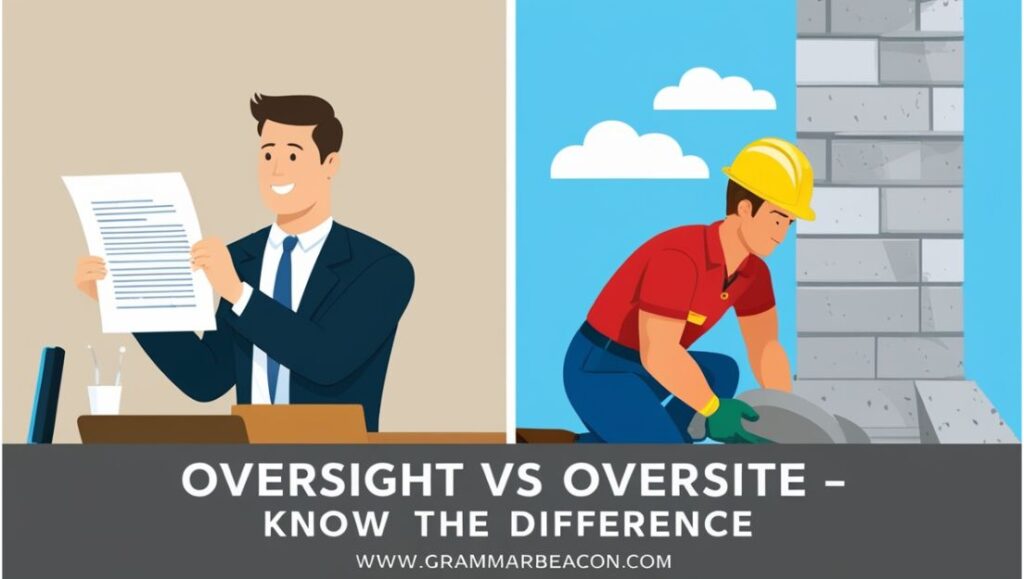Mixing up Oversight vs Oversite might seem like a small slip, but in the wrong context, it can completely change your message. These two terms sound nearly identical, yet they serve very different purposes especially in professional writing. Understanding the difference between oversight and oversite is essential if you want to communicate clearly and avoid embarrassing errors.
This guide breaks down each word, offering definitions, real-world examples, and tips to help you remember which one fits your sentence. Whether you’re managing a team, drafting a construction plan, or writing a report, knowing when to use Oversight vs Oversite will sharpen your language and boost your credibility.
What Is Oversight?
Oversight meaning covers a couple of different uses. First, it can mean supervision as in careful watching. Second, it often refers to an unintentional mistake or omission.
Oversight plays a big role in management oversight, regulatory oversight, and even everyday tasks. When a team overlooks a deadline, that’s an oversight error. When a government sets up a committee to watch over an industry, it’s oversight in management.
Here’s a scenario: Sarah missed sending her report on time because of an unintentional oversight. Meanwhile, the city’s planning committee exercises regulatory oversight to ensure public safety.
Read More: Tweek vs Tweak: Clarifying the Difference
What Is Oversite?
Oversite meaning is far more niche. In construction or architectural contexts, it refers to the concrete or protective layer beneath a building’s floor slab. Think of it as a sub-flooring layer that prevents moisture from seeping into the foundation.
- In construction oversite, professionals lay a concrete oversite layer (also called a moisture prevention layer) to protect floors.
- In architecture, this form of oversite in architecture ensures the building structure base stays dry and stable.
Example: The builders poured a 100mm concrete oversite layer before installing the timber floor to stop moisture from rising.
Differences Between Oversight and Oversite

Core Meaning Differences
| Term | Definition Style | Common Context | Usage Example |
| Oversight | Supervision or a mistake | Management, government, education, contracts | “The board has oversight of the budget.” / “It was an oversight to omit the data.” |
| Oversite | Construction layer | Architecture, civil engineering, building base | “Apply a 150mm oversite for moisture prevention.” |
The difference between oversight and oversite is not just spelling it’s worlds apart. Oversight can mean both supervising and forgetting. Oversite is always about concrete layer under floor in construction base layer or foundation materials contexts.
Oversight Examples in Real Life
- Project oversight: In product development, Emily was responsible for project oversight to ensure every milestone met quality standards.
- Unintentional oversight: Matt forgot to attach the annex to the email a classic mistake due to oversight.
- Oversight in management: A CEO’s management oversight can prevent costly errors or regulatory fines.
- Corporate oversight: Some companies have strong corporate oversight to maintain ethical standards and public trust.
Oversite Examples in Construction
- Construction oversite: During a renovation, the crew laid a moisture prevention layer known as a concrete oversite layer to guard against damp.
- Oversite in architecture: In designing a basement, the architect specified the sub-flooring layer commonly the oversite concrete.
- Technical term oversite: Engineers often note oversite concrete in blueprints to indicate waterproofing.
Read More: Than vs Then: Avoiding Common Mistakes in English
Why Knowing the Difference Matters
- Corporate oversight ensures compliance, credibility, and accountability.
- Using oversite incorrectly in professional writing can make you seem uneducated or careless.
- Mixing oversight and oversite leads to common language errors and can mislead readers.
- In legal contexts, using the wrong term in contracts or reports might cause misunderstandings especially in oversight in contracts.
Synonyms for Oversight
Because “oversight synonyms” help you sharpen your writing, here are some useful options:
- For supervision: supervision, management, governance, monitoring
- For error: lapse, omission, mistake, slip-up
Using synonyms like omission vs supervision lets you choose clearer wording where needed.
Synonyms for Oversite
Oversite doesn’t have everyday synonyms, but these terms describe related layers or functions:
- Sub-flooring layer
- Site foundation terminology
- Foundation materials
- Building structure base
Using these terms helps avoid confusion and explains exactly what’s beneath the concrete.
British vs American English: Any Difference?
In British vs American English terms, oversight and oversite remain the same. However, oversite is uncommon overall. You’ll mostly see it in UK technical specs. Americans talking about concrete oversite layer are probably quoting standards or blueprints. But outside architecture or construction, people rarely use oversite.
Common Mistakes with Oversight vs Oversite
- Using “oversite” when you mean “oversight”: Wrong: “Thanks for your oversite on the project.” Right: “Thanks for providing oversight on the project.”
- Using “oversight” in technical build documentation: Wrong: “Lay the oversight layer before pouring the slab.” Right: “Lay the oversite layer before pouring the slab.”
Such misused words in English can undermine professionalism or clarity in writing.
Tips to Avoid Confusion

- Mnemonic method: “If it’s about building a site, it’s oversite; if it’s about watching or missing something, it’s oversight.”
- Spell-check testing: Tools like Grammarly generally flag oversite as an uncommon word prompting you to confirm if it’s correct.
- Context trick:
- Use oversight in contexts of management oversight, educational oversight, or to describe a mistake due to oversight.
- Use oversite exclusively in mentions of construction base layer, sub-flooring layer, or moisture prevention layer.
- Sentence substitution test: If you can swap it with supervision or error, go with oversight. If it’s about a floor’s protective layer, it’s oversite.
Mnemonics That Work
- “Sight” vs “site” trick:
- Oversight connects with “sight” (watching, seeing, noticing).
- Oversite matches “site” (a location, site, or construction plot).
Practice Sentences
Oversight sentences:
- The manager’s regulatory oversight prevented the data breach.
- She realized the error came from unintentional oversight, not negligence.
- A new board created corporate oversight structures after last year’s scandal.
Oversite sentences:
- Before the slab was poured, they laid a thick concrete oversite layer.
- The engineer checked that construction oversite matched the specifications.
- In oversite in architecture, we use a moisture barrier under every floor.
Scenario Examples
Scenario A: Business Report
- Wrong: “We need oversight on the foundation.”
- Right: If you mean supervision: “We need more oversight on the foundation work.”
- If you mean concrete base: “We need a thick oversite under the foundation slab.”
Scenario B: Construction Blueprint
- Wrong: “Oversight concrete must be 75mm thick.”
- Right: “Oversite concrete must be 75 mm thick to serve as a moisture prevention layer.”
Scenario C: University Committee
- Wrong: “The committee provides oversite over student conduct.”
- Right: “The committee provides oversight over student conduct.”
Industry-Specific Examples
- Government oversight: Agencies perform regulatory oversight to enforce laws and protect safety.
- Educational oversight: Accrediting bodies handle educational oversight, ensuring schools meet standards.
- Professional writing tips: Avoid mixing these terms in professional writing to curb errors in professional writing.
- Construction terminology: Every blueprint must specify the oversite concrete layer for moisture control.
- Architectural terminology: In architecture, oversite in architecture means the structural protective layer below floor slabs.
- Building structure base: Without a correct oversite layer, a structure may suffer damp or instability.
Table: Quick Reference
| Feature | Oversight | Oversite |
| Definition | Supervision or unintentional mistake | Protective concrete base layer |
| Contexts | Management, governance, errors | Construction, architecture, site planning |
| Synonyms | Supervision, governance, lapse, omission | Sub-flooring layer, foundation materials |
| Example sentence | “He caught the error thanks to oversight.” | “They poured the oversite before the slab.” |
| Remember this tip | “Sight” (watch/notice) | “Site” (location/building site) |
FAQs
Can I use “oversite” instead of “oversight” in business writing?
No. Save oversite for construction or architectural contexts. In business, use oversight, not oversite.
How do I remember the correct usage?
Use the Sight vs Site trick oversight relates to seeing or missing, while oversite relates to a site foundation.
Does “oversight” always mean a mistake?
Not always. Oversight can mean supervision as well as a mistake due to omission.
Avoiding Common Pitfalls
- Run spellcheck, but don’t rely on it entirely especially for oversite which might not get flagged.
- Ask yourself: “Am I talking about watching/managing or building a base?” Then choose the correct term.
- Keep this cheat sheet handy until the difference becomes second nature.
Final Thoughts
Getting the words right matters. Oversight vs Oversite may look similar, but they mean very different things. Use oversight when talking about watching over something or making a mistake. Use oversite when you’re dealing with building foundations or concrete layers.
It’s easy to mix them up, but now you know the difference. Keep it simple think of sight for supervision, and site for construction. That one small letter changes everything. Remember these tips, and you’ll never confuse Oversight vs Oversite again. Clear words build clear communication.

James Logan is a seasoned blogger and language enthusiast behind Grammar Beacon. With years of experience in grammar and writing, James shares his expertise through insightful and engaging content. His passion for clear communication and linguistic precision shines in every post, making complex grammar concepts accessible and enjoyable for readers. Follow James for expert advice and tips to refine your writing skills.







